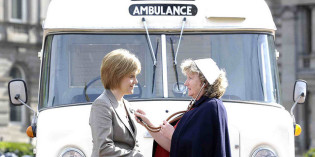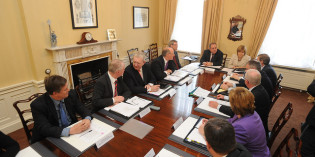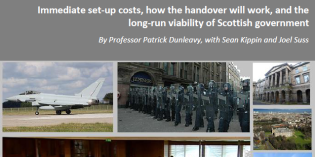Tag: Patrick Dunleavy

The best of Democratic Audit’s 2014 coverage of elections and electoral issues
2014 saw local and European elections in the UK, as well as elections right across the world. We also saw the relentless build up to the 2015 General Election. As a result, Democratic Audit carried a great deal of research and argument on elections both at home and further afield. As part of our continuing […]

The best of Democratic Audit’s 2014 coverage of Scotland’s democratic future
2014 was a momentous year for democracy north of the border, with long serving Alex Salmond stepping down to be replaced by the first female First Minister Nichola Sturgeon. More dramatically still, the country decided its future, opting to stay within the UK, despite a spirited ‘Yes’ campaign which can legimitamtely claim to have changed […]

Political and constitutional turbulence in the UK looks set to continue to 2020
Scotland’s ‘No’ vote solves one acute existential threat to the UK, says Patrick Dunleavy, but only for now. The likely narrow results of the May 2015 general election, plus David Cameron’s promise of another referendum on the UK leaving the European Union in 2017, both promise massive constitutional turbulence between now and 2020. For instance, if the UK votes to leave the European Union in 2017,a near-immediate […]

Debating Scotland’s transition costs: A response to Iain McLean’s critique
Iain McLean’s welcome comments can help us to see more clearly where some real uncertainties lie, says Patrick Dunleavy. Underneath the flim-flam of debate, the scope of debate about transition costs has focused down. Similar PostsThe best of Democratic Audit’s 2014 coverage of Scotland’s democratic futureThe Smith Commission Report is short, but packs a big punchWhat will it […]

What will it really cost to set up an independent Scotland? A critique of Patrick Dunleavy’s report
Iain McLean comments on a report by Patrick Dunleavy that claims that, in the event of a Yes vote in the upcoming referendum, there would be immediate set-up costs of only £200 million in stark contrast to the UK government’s own estimate of £2.7 billion. Iain argues that the number is likely to be in the area of £1.5 to […]

How costly would it be for Scotland to transition to independence?
With the referendum on Scotland’s future fast approaching, Patrick Dunleavy examines how costly it would be to set up an independent Scottish state. Coinciding with an op-ed written in The Sunday Post and re-posted on the LSE Politics and Policy Blog, this article outlines the main points of a longer report which can be downloaded here. Similar PostsHow democratic are the UK’s two […]

Everything you need to know about the regional contests in the European Parliament elections across the UK
The Democratic Audit team have been running a series of posts previewing the European Parliament elections in the UK on a seat-by-seat basis. Here, the team summarise these previews, while providing additional information about the electoral systems in use for the contest, and a set of simplified ballot papers which show each candidates actual chances of being […]

Euro elections – what will happen in London?
This week London will choose eight representatives in the European Parliament, with Labour expected to top the polls, overturning the Conservatives lead in 2009 despite recent signs of economic revival. Opinion polls suggest that London is the most pro-European region of the country, and its population is also quite multi-ethnic, more diverse and younger than […]

Why all our top parties are doing voters a disservice by cramming the European Parliament ballot papers with the names of ‘no hope’ candidates
When British voters go to the polls on 22 May to elect MEPs to the European Parliament for another five years, they will face complex ballot papers with large number of candidates on them. The Democratic Audit team explain how the List PR system works and show how all the major parties follow practices that […]

We should enfranchise young people at 16 while they are still living at home in a settled community
Young voters are less likely to participate in elections than older generations. In this extract from Democratic Audit’s new report, Richard Berry and Patrick Dunleavy show how this is linked to the high levels of mobility among young people above the age of 18, who tend to live in rented accommodation and to move home […]


 Democratic Audit's core funding is provided by the Joseph Rowntree Charitable Trust. Additional funding is provided by the London School of Economics.
Democratic Audit's core funding is provided by the Joseph Rowntree Charitable Trust. Additional funding is provided by the London School of Economics.